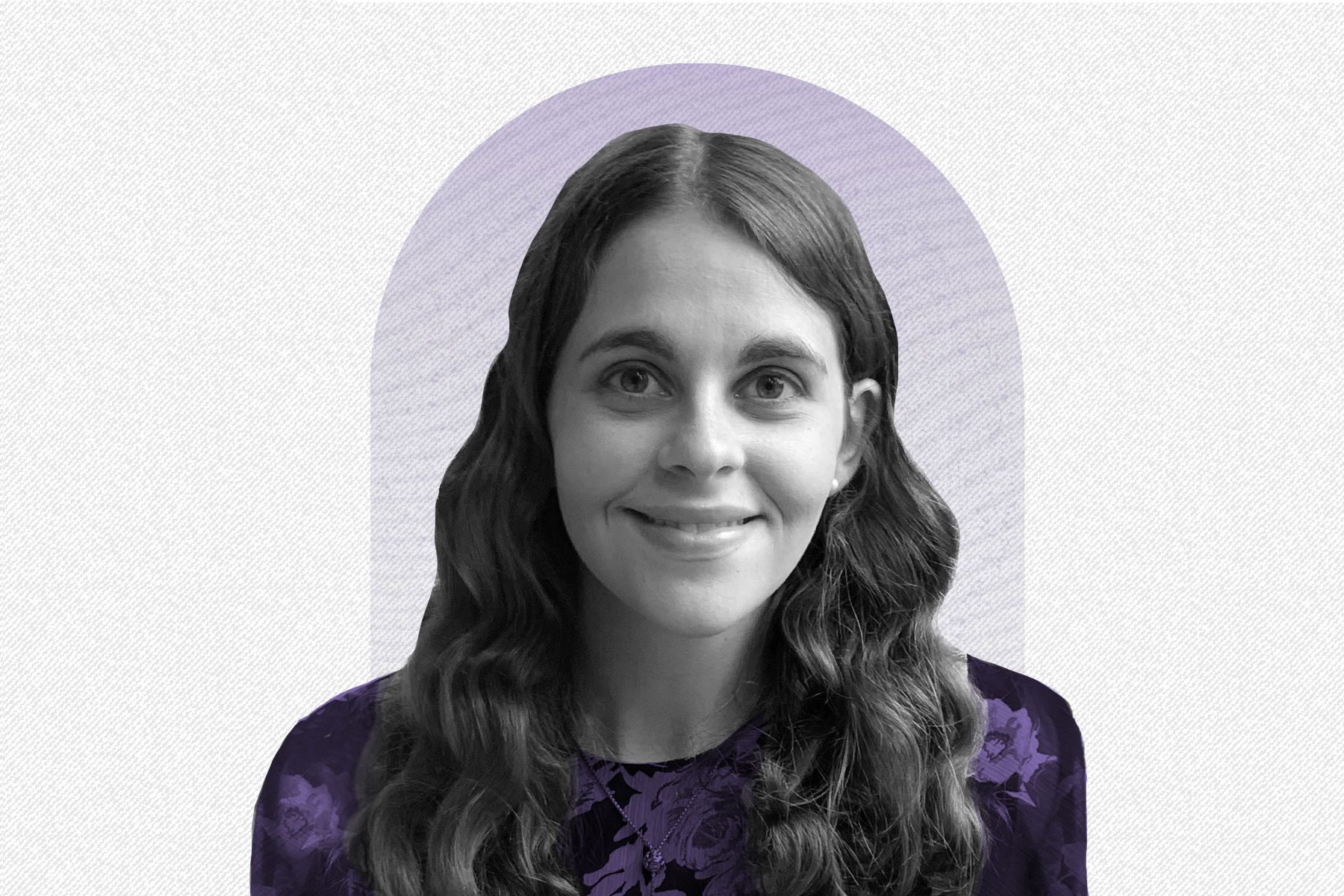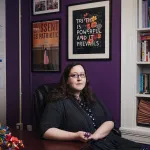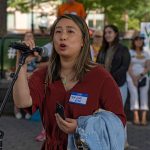We’re telling the untold stories of women, women of color and LGBTQ+ people. Sign up for our daily newsletter.
When Autism Awareness Month, also known as Autism Acceptance Month, began in 1972, there were few autistic voices involved in advocacy and leadership. The dialogue around autism was almost entirely dominated by parents of autistic children. But in the past decade, there has been a sea change in the conversation around autism — as well as who is leading it.
Jordyn Zimmerman, 28, is one emerging young leader. She serves on the boards of multiple disability organizations and was the focus of a documentary, “This is Not About Me.” In 2022, she was also appointed to the President’s Committee for People with Intellectual Disabilities. These would be remarkable accomplishments for anyone, but they are even more remarkable because Zimmerman types to communicate.
It is difficult to say precisely what percentage of autistic adults are nonspeaking. An estimated 25 to 30 percent of autistic people use few or no words to communicate through speech. Nonspeaking autistic people have been underrepresented in leadership and media representation. In particular, media representation has been overwhelmingly White, male and highly verbal. But slowly, that tide is changing.
Until she was 18, Zimmerman was assumed to be too intellectually disabled to meaningfully communicate. She was frequently restrained or secluded by teachers for acting out or attempting to run away. She has become an advocate for the use of alternative means of communicating, particularly through her work with CommunicationFIRST, a nonprofit focused on positioning communication for people with disabilities as a civil and human right.
For Autism Acceptance Month, The 19th interviewed Zimmerman about her life and advocacy work as a nonspeaking autistic person. The interview was conducted over Zoom. Some questions were provided in advance as a disability accommodation, and some involved Zimmerman typing out her answers in real time.
This interview has been edited for length and clarity.
Sara Luterman: What is AAC?
Jordyn Zimmerman: AAC is short for “augmentative and alternative communication.” It’s essentially all the ways someone may communicate besides speaking. It refers to any tool or method or support to help someone be heard or understood. The “augmentative” is usually meant to add to someone’s speech, and the “alternative” is usually meant to be instead of someone’s speech. For me, iPad paired with a text-based application serves as the tool that allows me to reliably and effectively be heard and understood.
So what was school like for you before you learned how to use AAC?
School was pretty terrible. School is the hub of our communities, and I was segregated within school. So I was therefore segregated from my community. Within school for years, people talked about me like I couldn’t understand them. And even like I didn’t exist. I was easily controlled and manipulated by adults, restrained and secluded and made to complete repetitive tasks with the belief that I didn’t understand them or my surroundings. I was in a perpetual state of discomfort and dysregulation within my own body. There was so much I wanted to say, so much I wanted to add and so much I wanted to change that was all built up in my head.
As I got a bit older, I was also provided access to PECS [the Picture Exchange Communication System] and other picture cards with the hope of me requesting basic items or activities such as the bathroom, cookies, specific people, etc. But those picture cards were inherently limiting and not only made me extremely frustrated and overwhelmed due to the fact that they were difficult to access, but they also impeded my ability to show others that I did have intact thinking. Without any way to show my language, I remained segregated, often in a room completely by myself fighting through repetitive tasks. It took years of advocacy for me to receive the appropriate communication support and even then, it was difficult for folks to recognize that I belonged and that I was worthy.
How did you learn how to type, and what changed in your life that made it an option?
In December 2013, when I was 18 years old, there was an incident at school which prompted my mom to contact Disability Rights Ohio. When the attorney came to our home in January, prior to a meeting at the school, she wanted to communicate with me. My mom had previously gotten me an iPad with a super basic communication app, so she positioned it near me and prompted me to use it. I was so angry with the school and excited that this professional genuinely wanted to talk to me that I recalled painfully holding my body back and sitting on the couch as I touched pictures to describe my experiences of pain within the education system.
The attorney advocated for the district to go through the proper procedures and processes of completing an assistive technology evaluation that summer, so in June 2014, I went to the Mentor Cardinal Autism Resource and Education School, also known as CARES, and started becoming more proficient with typing. It was something that really started by chance and luck and took a lot of hard work and perseverance.
Can you tell me a little bit about your work with CommuncationFIRST? What does the organization do?
I am currently board chair of CommunicationFIRST. We are the only national nonprofit dedicated to advancing and protecting the rights of the estimated five million children and adults who cannot rely on speech to be heard or understood. The mission is to protect and advance the rights, autonomy, opportunity and dignity of people with speech-related disabilities through public engagement, policy and practice reform and systemic advocacy. Some of the things CommunicationFIRST works on include ensuring access to robust communication tools, improving access to health care, improving self determination and initiatives around supported decision-making and more.
CommunicationFIRST is cross-disability, which is really important because whether someone is autistic or has ALS, our human rights and the discrimination that we face related to communication access is similar. As board chair, I discuss and advocate with my colleagues and the broader community for cross-disability, intersectional policy change, help develop and determine board strategy priorities and help set the financial framework in partnership with the leadership of CommunicationFIRST.
In 2022, you were appointed to the President’s Committee for People with Intellectual Disabilities, also known as PCPID. What does PCPID do? And what are your goals for your time on the committee?
PCPID focuses on ensuring the inclusion, interdependence and access for people with intellectual and developmental disabilities. We do this by developing guidance and workgroups as a full committee, and ensuring cross-collaboration between federal agencies and the disabled people most impacted by the policies. I hope to continue learning from my fellow committee members and advocating for the services and supports people need.
It’s Autism Acceptance Month. What does that mean to you? And what do you feel like the month should be about?
As an autistic person, Autism Acceptance Month is no different than any other month. While this month is a great month to rally, it should still be about understanding our humanity and recognizing that there is no one way to communicate, to interact, to love or to be. I think the month should be about listening to the various voices that make up our community, disrupting ableism and systems of oppression and calling for action. It’s really about recognizing our right to be in spaces every single day and knowing we have worth. For me, every month is also about action and ensuring access for me and others within the community.
What policy changes would you like to see to make life better for nonspeaking children and adults?
There are so many changes I’d like to have happen. But I’ll name three that are all interconnected. The first is policy that pushes for educators to be provided with extensive training on getting students communication support as early as possible. I don’t think this should just be on the speech therapist, I think it’s the responsibility of everyone. Communication is an access point for a lot of things we do as humans. And it’s a basic right. Too often, students are stuck either relying on luck or privilege. We need specific policy that mandates training and support.
The next is IQ scores. In our schools, when students who are nonspeaking or have unreliable speech are given IQ tests, it impedes access to robust language-based communication supports. That’s another policy change I’d really like to happen — ensuring no one who cannot rely on speech is given IQ tests.
I know for me, the assumptions underlying my IQ score had such a negative impact on people’s perceptions of me, as well as my perception of myself. Professionals talked around me thinking I didn’t understand. While there is nothing shameful about a low IQ score, folks continuously conveyed to me that I was a failure in society because of my poor motor skills and speech. However, that should have never happened. I should have never been given one IQ test, let alone multiple.
And the third is home- and community-based services, which really encompasses so much and cannot be overstated in terms of its importance. I know I personally rely on my mom to get the care I need to be able to live and work. And this is the case of so many nonspeakers. I also have epilepsy, and many folks in the community also have co-occurring needs.
There aren’t a lot of high-visibility people in advocacy or otherwise who are nonspeaking. How have you found community and role models, doing the work that you do?
There are so many barriers to access and having the support and services folks need to engage in this work. I feel so fortunate to have had the opportunity to participate in the Autistic Self Advocacy’s Autism Campus Inclusion program this summer after my second year of college. I admire Julia Bascom [executive director of the Autistic Self Advocacy Network] so much. The summer after my third year of college, I was also privileged to intern as part of the American Association of People with Disabilities internship program. During this time in D.C., Judy Heumann [widely considered the mother of the American disability rights movement] connected me with Bob Williams and India Ochs, two folks who cannot rely on speech to communicate and work or previously held high positions within the government. Bob is also the policy director for CommunicationFIRST, and India is on the board. I feel fortunate to have them as leaders within the community.
Is there anything I didn’t ask that you think is important for people to know?
There’s always a lot of discomfort when people who cannot rely on speech are in the room, but people are starting to recognize that we are needed, especially when we are directly or inadvertently being discussed. While we are not afraid to bring ourselves to spaces that we don’t get invited to, the invite matters. Nonspeaking autistic people should be at the center of discussions, research, policy decisions and issues about us.






